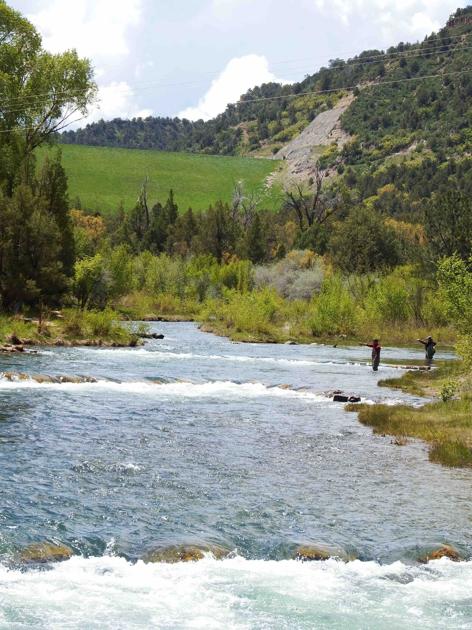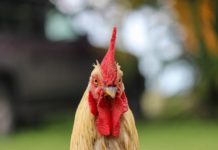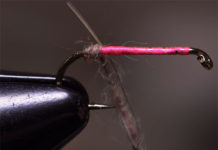Few visitors to Ridgway State Park’s Pa-Co-Chu-Puk area, the most popular place in all of Ouray County when it comes to fly fishing, are likely to think about the garbage people leave behind here.
Indeed, they are likely not even to notice it.
It is not a ‘trashy’ locale, certainly not overtly, and “especially in comparison to cities,” Tanya Ishikawa said.
Readers may recognize Ishikawa’s moniker from her occasional writing for this newspaper (full disclosure). She is also communications director for the Uncompaghre Watershed Project, the local nonprofit whose mission (as its name implies) “is to help protect the natural, scenic and economic values of the Upper Uncompaghre River Watershed.”
On Wednesday, the UWP will host a Pa-Co-Chu-Puk cleanup event for an elusive type of refuse that you have to look closely for. It is not so obvious as a stray soda can (for example), or a cast-off Ziploc bag, but it can be deadly to wildlife, both in and out of the water.
It’s stray fishing line.
“The amazing thing about the line is, given the amount of fishing that goes on at Pa-Co-Chu-Puk, a lot of it gets lost here,” Ishikawa observed. “It blows away and wraps around things. You never know where you’re going to find it.”
The event this week is thanks to Nolan Tappenden, a park ranger at Ridgway State Park who is both an avid fly fisherman himself, and a passionate advocate for cleaning up the local environment, both along the riverbank and farther afield (“When I was talking to Nolan in the parking lot the other day,” Ishikawa said, “He was pulling line from out of the cracks in the pavement”).
The UWP hopes this event will become an annual affair. It started small last year, with Tappenden, eager volunteers, and an assist from eagle-eyed employees out of RIGS Fly Shop and Guide Service in Ridgway. This year will feature volunteer staff from local outfitters based slightly farther away: Montrose Anglers and Telluride Fly fishers. Both guide services prize (and bring clients to) Pa-Co-Chu-Puk for its terrific fly fishing opportunities, which include not only the stretch of the Uncompaghre River below Ridgway Dam but also two ponds stocked with rainbow trout.
Last year, the cleanup event took place on a Saturday, in the morning. But in this unusual season, local guides are still busy with clients on weekends, so it has been rescheduled to a weekday afternoon (a slightly warmer time of day, given that this is mid-October).
It’s still a good time to keep fishing, in other words, and to get out and help clean up, given that this sort of refuse won’t disappear for a very long time. As the UWP’s website points out, plastic beverage bottles take up to 450 years to decompose in nature. Styrofoam cups last up to 50 years; nylon fabric 40 years; and fishing line, the most elusive culprit, hangs around in the environment for six centuries. “The monofilament takes 600 years to break down,” Tappenden confirmed. “We don’t want fluorocarbons in the water. Plus, a lot of (lures in the shape of) flies that get left behind look like insects. Songbirds pick them up.”
Visitation is up 30 percent on average this year compared to previous seasons, Tappenden said. “We’re still very busy. There are still very many visitors.” There is still much work to be done: the event Wednesday goes from 1-4 p.m. The UWP will provide bags and buckets for stray fishing line and other trash. Think of it as a meditative outing: “It’s not like you go, ‘There’s a huge piece of trash,’ and run and grab it,” Ishikawa said. “It’s more of a slow walk, so you can really see what’s there.” Children are welcome, though given its slow-moving, deliberative pace, this gathering is probably best for ages 10 and up. Well-behaved pets can come, too (please keep them on-leash).
“We’ll have free drinks and snacks,” Ishikawa said. “Kudos to Nolan for inspiring this.”
“From a biased perspective, I’m a very avid fisherman at Pa-Co-Chu-Puk,” Tappenden said. “I know how much visitation it gets, and what that looks like and what gets left behind. The river gets a lot of use, so it’s nice to give back, and keep it picked up.”
To learn more about the Uncompaghre Watershed Project, or to make a donation, visit uncompaghrewatershed.org. If you’re planning on participating Wednesday, please register online (click on ‘events’) so the UWP can plan for how much food and drink to have on hand, and forward more detailed information.
Credit: Source link






























